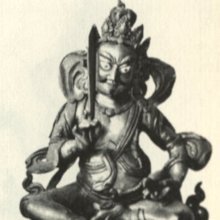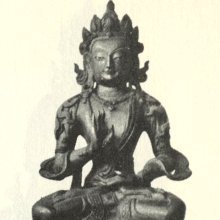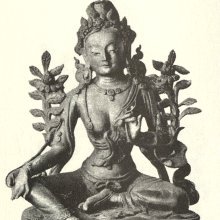Chu, Chū: 9 definitions
Introduction:
Chu means something in Hinduism, Sanskrit, the history of ancient India, Marathi, Jainism, Prakrit, Hindi, biology. If you want to know the exact meaning, history, etymology or English translation of this term then check out the descriptions on this page. Add your comment or reference to a book if you want to contribute to this summary article.
Alternative spellings of this word include Chhu.
Ambiguity: Although Chu has separate glossary definitions below, it also represents an alternative spelling of the word Cu.
Images (photo gallery)
(+360 more images available)
India history and geography
Source: Shodhganga: Vernacular architecture of Assam with special reference to Brahmaputra ValleyChu is a Garo term referring to “traditional rice beer”.—It appears in the study dealing with the vernacular architecture (local building construction) of Assam whose rich tradition is backed by the numerous communities and traditional cultures.

The history of India traces the identification of countries, villages, towns and other regions of India, as well as mythology, zoology, royal dynasties, rulers, tribes, local festivities and traditions and regional languages. Ancient India enjoyed religious freedom and encourages the path of Dharma, a concept common to Buddhism, Hinduism, and Jainism.
Biology (plants and animals)
Source: Wisdom Library: Local Names of Plants and DrugsChu [চূ] in the Manipuri language is the name of a plant identified with Saccharum officinarum L. from the Poaceae (Grass) family. For the possible medicinal usage of chu, you can check this page for potential sources and references, although be aware that any some or none of the side-effects may not be mentioned here, wether they be harmful or beneficial to health.

This sections includes definitions from the five kingdoms of living things: Animals, Plants, Fungi, Protists and Monera. It will include both the official binomial nomenclature (scientific names usually in Latin) as well as regional spellings and variants.
Languages of India and abroad
Marathi-English dictionary
Source: DDSA: The Molesworth Marathi and English Dictionarychū (छू).—ind The sound used in setting on a dog. Ex. arēvānarālā chū. chū karaṇēṃ or mhaṇaṇēṃ To set on; to incite or encourage (dogs, boys &c. to fight).
Source: DDSA: The Aryabhusan school dictionary, Marathi-Englishchū (छू).—ind The sound used in setting on a dog. chū karaṇēṃ or mhaṇaṇēṃ To set on, to in- cite or encourage (dogs, boys &c. to fight).
Marathi is an Indo-European language having over 70 million native speakers people in (predominantly) Maharashtra India. Marathi, like many other Indo-Aryan languages, evolved from early forms of Prakrit, which itself is a subset of Sanskrit, one of the most ancient languages of the world.
Sanskrit dictionary
Source: Cologne Digital Sanskrit Dictionaries: Shabda-Sagara Sanskrit-English DictionaryChu (छु).—r. 1st cl. (chyavate) To go, to move or approach: see cyu . bhvā0 ātma0 ja
Sanskrit, also spelled संस्कृतम् (saṃskṛtam), is an ancient language of India commonly seen as the grandmother of the Indo-European language family (even English!). Closely allied with Prakrit and Pali, Sanskrit is more exhaustive in both grammar and terms and has the most extensive collection of literature in the world, greatly surpassing its sister-languages Greek and Latin.
Hindi dictionary
Source: DDSA: A practical Hindi-English dictionaryChū (छू) [Also spelled chhu]:—(nf) sudden outblow of a gush of air from the mouth (as during incantation, conjuration, enchantment, magic, etc); ~[maṃtara] an incantation; a charm; hey presto !; —[karanā] to exorcise, to pronounce an incantation and blow upon; to cause to disappear, to vanish; —[bananā] to disappear, to vanish (said of animate objects); ~[maṃtara honā] (said of person, pain, etc.) to disappear forthwith, to vanish.
...
Prakrit-English dictionary
Source: DDSA: Paia-sadda-mahannavo; a comprehensive Prakrit Hindi dictionaryChu (छु) in the Prakrit language is related to the Sanskrit word: Kṣud.
Prakrit is an ancient language closely associated with both Pali and Sanskrit. Jain literature is often composed in this language or sub-dialects, such as the Agamas and their commentaries which are written in Ardhamagadhi and Maharashtri Prakrit. The earliest extant texts can be dated to as early as the 4th century BCE although core portions might be older.
Kannada-English dictionary
Source: Alar: Kannada-English corpusChū (ಛೂ):—[noun] a word used to command a dog to fall upon (someone) or to attack.
Kannada is a Dravidian language (as opposed to the Indo-European language family) mainly spoken in the southwestern region of India.
Nepali dictionary
Source: unoes: Nepali-English DictionaryChu is another spelling for चु [cu].—interj. an indeclinable word to denote surprise/wonder;
Nepali is the primary language of the Nepalese people counting almost 20 million native speakers. The country of Nepal is situated in the Himalaya mountain range to the north of India.
See also (Relevant definitions)
Starts with (+2065): Chu bai pi, Chu chin, Chu chong ju, Chu gia dinh, Chu kuei, Chu lcan, Chu liu, Chu ma, Chu mef, Chu o rien, Chu ping lang, Chu shi, Chu shi zi, Chu Shih-hsing, Chu tao, Chu tsai, Chu ya, Chu ya tsao chia, Chu yang yang, Chu-chat.
Ends with (+955): Acacia catechu, Acchu, Acchuacchu, Achu, Acivakkacu, Acukucu, Ahitecchu, Aiciracu, Aikkuncu, Aintaccu, Aivacu, Aivecu, Aiyancu, Akacu, Akkiramappeccu, Akkucu, Akkulpayccu, Akkuluppayccu, Aksharachunchu, Al-utaiyaaracu.
Full-text (+115): Chum bao, Chum-ruam-phanom, Chuchundari, Chum-het-thai, Chum het lek, Chum bap, Tan chu ye, Panktibhau, Chum bao dua, Chum, Guiyam, Chu shi, Chu tao, Chu-rtsa, Ohuri chu, Chu ya, Chu chin, Tatu hungwa chu, Yu chu, Chu-wa.
Relevant text
Search found 39 books and stories containing Chu, Chū; (plurals include: Chus, Chūs). You can also click to the full overview containing English textual excerpts. Below are direct links for the most relevant articles:
Blue Annals (deb-ther sngon-po) (by George N. Roerich)
Chapter 2 - The Ma System (rma lugs kyi skabs) < [Book 12 - Peace-Making Lineages]
Chapter 4 - The Kam System (skam lugs kyi skabs) < [Book 12 - Peace-Making Lineages]
Chapter 5a - Minor lineages (brgyud phran gyi skabs) < [Book 12 - Peace-Making Lineages]
Krishna to Radha < [January, 1928]
Novelty and Poetry < [January 1970]
Chu Yuan And His Li Sao < [October 1965]
Tiruvaymoli (Thiruvaimozhi): English translation (by S. Satyamurthi Ayyangar)
Pasuram 4.2.7 < [Section 2 - Second Tiruvaymoli (Palan ay, El ulaku untu)]
Pasuram 10.10.7 < [Section 10 - Tenth Tiruvaymoli (Muniye! nanmukane!)]
Mahabharata (English) (by Kisari Mohan Ganguli)
Section XVII < [Astika Parva]
Ramayana of Valmiki (by Hari Prasad Shastri)
Chapter 45 - The Departure of the Monkeys < [Book 4 - Kishkindha-kanda]
Chapter 32 - Shurpanakha upbraids Ravana and urges him to destroy Rama < [Book 3 - Aranya-kanda]
Chapter 20 - Ravana’s Meeting with the Sage Narada < [Book 7 - Uttara-kanda]
Jnaneshwari (Bhavartha Dipika) (by Ramchandra Keshav Bhagwat)
Verse 10.41-42 < [Chapter 10 - Vibhuti-yoga]
Verse 11.42 < [Chapter 11 - Vishvarupa-darshana-yoga]
Verse 18.66 < [Chapter 18 - Moksha-sannyasa-yoga]





